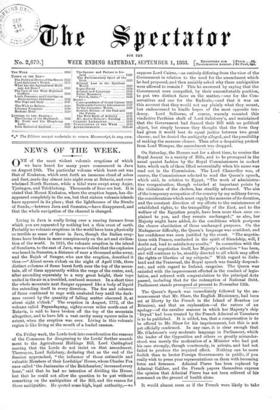On Friday week, the Lords took into consideration the reasons
of the Commons for disagreeing to the Lords' further amend- ment to the Agricultural Holdings Bill, Lord Carlingford moving that the Lords do not insist on that amendment. Thereupon, Lord Salisbury, declaring that as the end of the Session approached, "the influence of those estimable and valuable Members of their Lordships' House, whom Charles Fox once called the Janissaries of the Bedchamber,' increased every hour," said that he had no intention of dividing the House, but that he could not allow the question to be put without remarking on the ambiguities of the Bill, and the reason for those ambiguities. He quoted some high, legal authority,—we suppose Lord Cairns,—as entirely differing from the view of the Government in relation to the need for the amendment which he had proposed, and then amiably asked why these ambiguities were allowed to remain ? This he answered by saying that the Government were compelled, by their uncomfortable position, to put two distinct faces on the matter,—one for the Con- servatives and one for the Radicals,—and that it was on this account that they would not say plainly what they meant, but endeavoured to kindle hopes of the most opposite ten- dency. Lord Selborne, of course, warmly resented this vindictive Parthian shaft of Lord Salisbury's, and maintained that the Government had framed their Bill with no political object, but simply because they thought that the form they had given it would best do equal justice between two great classes ; and he denied the ambiguity alleged, and the possibility' of making the measure clearer. Then after a despairing protest from Lord Wemyss, the amendment was dropped.


































